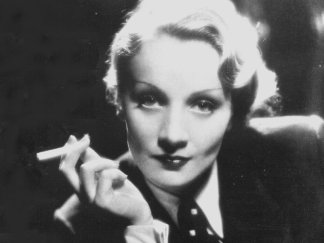 Back to selection
Back to selection
THANKS BE TO “MARLENE” AT STRANGER THAN FICTION
 As inflatable stars arrive in Manhattan ready for their Macy’s close-up, one of the biggest stars in the history of film won’t be at the parade — she’ll be at the IFC Center. Tonight, Stranger Than Fiction will feature its penultimate screening, Marlene, a revival of the 1984 documentary about the reclusive film star Marlene Dietrich, directed by Maximilian Schell, an actor who appeared with Dietrich in Judgment at Nuremberg.
As inflatable stars arrive in Manhattan ready for their Macy’s close-up, one of the biggest stars in the history of film won’t be at the parade — she’ll be at the IFC Center. Tonight, Stranger Than Fiction will feature its penultimate screening, Marlene, a revival of the 1984 documentary about the reclusive film star Marlene Dietrich, directed by Maximilian Schell, an actor who appeared with Dietrich in Judgment at Nuremberg.
Presented by John Walter, the director of How to Draw A Bunny and Theater of War, Marlene is partly the story of Dietrich and partly the story of Schell’s dogged pursuit of a reluctant subject. Despite their friendship, the notoriously private star turned down his interview requests over and over again. After much pleading, Dietrich finally agreed to an interview but with one non-negotiable condition — Schell could not record her face.
I recently spoke with Walter about how Schell solved a seemingly insolvable problem.
Filmmaker: For most doc filmmakers, access is a key component to a project. If they don’t have access, they simply won’t do it, but Schell was undeterred.
Walter: One of the things I like about this movie is that he’s really an amateur. He’s doing it for love, and so he’s not straight jacketed by convention. He’s going on an adventure and doing his best to report back on what he finds. The conflict that he’s having with his main character becomes part of the drama of the film. He gets all this back and forth between them into the film. That interaction reveals a lot about who she is a person, stuff you wouldn’t be able to get into a straight documentary.
Filmmaker: It’s actually refreshing that Dietrich didn’t want him to film her, especially in the age of reality TV where every actor seems willing to expose everything about themselves in exchange for a little attention.
Walter: I think it was a generational ethic. You never see Cary Grant as an old man. He retired from movies when he started looking too old.
Filmmaker: I know Schell as an actor but not as a documentary filmmaker. What inspired him to turn to non-fiction filmmaking?
Walter: He was one of the most successful German actors in the history of American cinema. As far as I know, he’s only done one other documentary – which was about his sister. They’re just pure acts of love for this character, this person, this woman, whether it’s Dietrich or his sister. I don’t think it was a preoccupation with non-fiction story telling that made him do this film. It was knowing this extraordinary person and wanting to be able to convey that back to the world.
Filmmaker: What exactly was it that he wanted to convey about Dietrich?
Walter: This movie came out in ’84. This is a world that’s already forgetting her. None of the Hollywood stars were going to be around all that much longer, so it was the last historical moment for him to be able to make a film like this. Her resistance becomes the appropriate setting for his portrait of her. She’s really is fiercely protective. The limitations between herself and her audiences are very clear for her.
Filmmaker: The limitation was clear for her but not for Schell –
Walter: The really bold thing Schell is that he decided that rather than thinking of all she put him through as a hassle, he decided to incorporate it into the film…. He built a set that recreated the room in which the interview was conducted. Part of what he’s trying to do is that it felt like a very aggressive therapy session, where he’s showing her things she doesn’t want to look at and try to force her to respond. It’s part of this quality that I like about docs where on some level they operate as their own memoir of their own creation.
— Mary Anderson Casavant
